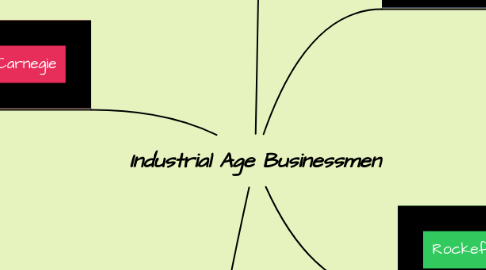
1. J.P. Morgan
1.1. April 17, 1837-March 31, 1913
1.1.1. powerful businessmenfounding of private banks and industrial consolidation
1.1.1.1. worked with William Vanderbilt in 1879
1.1.1.2. broke new ground by arranging the merger of Edison General Electric and Thomson-Houston Company to form General Electric in 1892
1.1.1.3. called to aid the U.S. government in the grips of an economic panic
1.1.1.4. Founded J.P. Morgan Chase and co.
1.1.1.5. leaft behind a world-renowned art collection and a business that remained a financial powerhouse
2. Carnegie
2.1. November 25, 1835- August 11, 1919
2.1.1. American industrialist who amassed a fortune in the steel industry then became a major philanthropist
2.1.1.1. worked in a Pittsburgh cotton factory as a boy before rising to the position of division superintendent of the Pennsylvania Railroad in 1859
2.1.1.2. invested in various ventures, including iron and oil companies, and made his first fortune by the time he was in his early 30s
2.1.1.3. he entered the steel business, and over the next two decades became a dominant force in the industry
2.1.1.4. sold the Carnegie Steel Company to banker John Pierpont Morgan for $480 million
2.1.1.5. devoted himself to philanthropy, eventually giving away more than $350 million
3. Ford
3.1. July 30, 1863-April 7, 1947
3.1.1. established the Ford Motor Company
3.1.1.1. an engineer for the Edison Illuminating Company
3.1.1.2. built his first gasoline-powered horseless carriage, the Quadricycle, in the shed behind his home
3.1.1.3. introduced large production plants
3.1.1.4. introduced interchangeable parts
3.1.1.5. drew controversy for his pacifist stance during the early years of World War I and earned widespread criticism for his anti-Semitic views and writings
4. Vanderbilt
4.1. May 27, 1794-January4,1877
4.1.1. Shipping and railroad made him became one of the wealthiest Americans of the 19th century
4.1.1.1. nicknamed "the Commodore"
4.1.1.2. gained a reputation for being fiercely competitive and ruthless
4.1.1.3. In the 1860s, he shifted his focus to the railroad industry
4.1.1.4. built another empire (railroad) and helped make railroad transportation more efficient
4.1.1.5. Built Grand Central
5. Rockefeller
5.1. July 8, 1839-May 23,1937
5.1.1. founder of the Standard Oil Company
5.1.1.1. one of the world’s wealthiest men and a major philanthropist
5.1.1.2. controlled some 90 percent of U.S. refineries and pipelines
5.1.1.3. U.S. Supreme Court found Standard Oil in violation of anti-trust laws and ordered it to dissolve
5.1.1.4. donated more than $500 million to various philanthropic causes.
5.1.1.5. created the term "monopoly", which was buying out the competition
